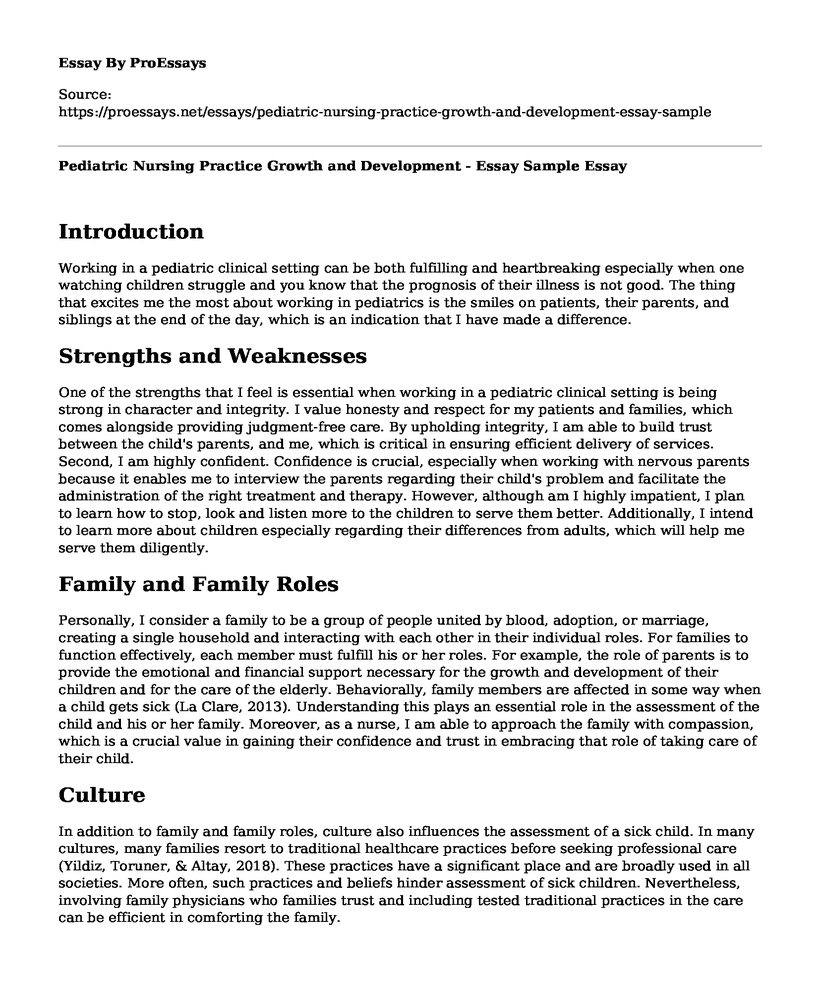Introduction
Working in a pediatric clinical setting can be both fulfilling and heartbreaking especially when one watching children struggle and you know that the prognosis of their illness is not good. The thing that excites me the most about working in pediatrics is the smiles on patients, their parents, and siblings at the end of the day, which is an indication that I have made a difference.
Strengths and Weaknesses
One of the strengths that I feel is essential when working in a pediatric clinical setting is being strong in character and integrity. I value honesty and respect for my patients and families, which comes alongside providing judgment-free care. By upholding integrity, I am able to build trust between the child's parents, and me, which is critical in ensuring efficient delivery of services. Second, I am highly confident. Confidence is crucial, especially when working with nervous parents because it enables me to interview the parents regarding their child's problem and facilitate the administration of the right treatment and therapy. However, although am I highly impatient, I plan to learn how to stop, look and listen more to the children to serve them better. Additionally, I intend to learn more about children especially regarding their differences from adults, which will help me serve them diligently.
Family and Family Roles
Personally, I consider a family to be a group of people united by blood, adoption, or marriage, creating a single household and interacting with each other in their individual roles. For families to function effectively, each member must fulfill his or her roles. For example, the role of parents is to provide the emotional and financial support necessary for the growth and development of their children and for the care of the elderly. Behaviorally, family members are affected in some way when a child gets sick (La Clare, 2013). Understanding this plays an essential role in the assessment of the child and his or her family. Moreover, as a nurse, I am able to approach the family with compassion, which is a crucial value in gaining their confidence and trust in embracing that role of taking care of their child.
Culture
In addition to family and family roles, culture also influences the assessment of a sick child. In many cultures, many families resort to traditional healthcare practices before seeking professional care (Yildiz, Toruner, & Altay, 2018). These practices have a significant place and are broadly used in all societies. More often, such practices and beliefs hinder assessment of sick children. Nevertheless, involving family physicians who families trust and including tested traditional practices in the care can be efficient in comforting the family.
The Comfort Theory
The Theory of Comfort is a mid-range theory for nursing practice and research that was introduced by Kolcaba in 2001. Kolcaba defined comfort as an instantaneous state of being energized after one acquires human needs like relief, ease, and transcendence (Tappen, 2016). This theory helps me to understand that enhanced comfort strengthens pediatric patients and their family members to engage in activities necessary for attaining health and remaining healthy. Hence, it prompts me to organize care that is focused on holistic comfort for my pediatric patients and their families.
Goals and Objectives for the Practicum Experience
My primary goals and objectives include:
- To learn how to stop, look and listen more to the children to be able to deal with their diverse needs.
- To have the ability to assess parents' emotions and needs to be able to build their trust and confidence in letting me take over the role of taking care of their sick child while at the hospital.
- To develop cultural competence in the pediatrics clinical settings to enable me serve my pediatric patients from a diverse cultural background efficiently
Timeline of Practicum Activities
During my first week, I was able to observe three patients. Then, I participated in care of two pediatric patients although alongside my preceptor.
References
La Clare, H. L. (2013). The Impact of Childhood Chronic Illness on the Family: Psychosocial Adjustment of Siblings.
Tappen, R. M. (2016). Advanced nursing research: From theory to practice. Jones & Bartlett Publishers.
Yildiz, S., Toruner, E. K., & Altay, N. (2018). Effects of different cultures on child health. Journal of Nursing Research and Practice, 2(2).
Cite this page
Pediatric Nursing Practice Growth and Development - Essay Sample . (2022, Nov 24). Retrieved from https://proessays.net/essays/pediatric-nursing-practice-growth-and-development-essay-sample
If you are the original author of this essay and no longer wish to have it published on the ProEssays website, please click below to request its removal:
- Safety Plan
- Children with Disabilities in Foster Care Systems - Research Paper Examlple
- The Control of Mosquitoes Through the Use of Chemicals Paper Example
- Essay Example on Harmful Behaviours by Health Workers: What is Acceptable?
- Essay Sample on COVID-19: Impact on Supply Chain Management & Strategies for Recovery
- Eclampsia: Causes, Risk Factors, & Seizures in Pregnant Women - Essay Sample
- Essay on Age-Related Deterioration: Understanding Aging Theories to Promote Quality Services for Older Adults







